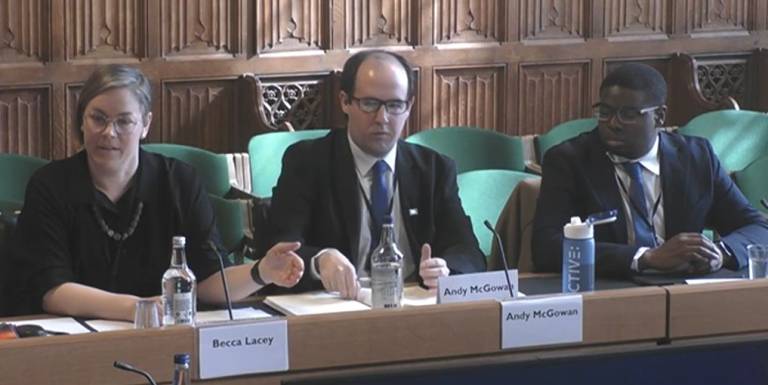ICLS young carers research presented to DWP
25 April 2024
ICLS' Rebecca Lacey gives evidence to DWP Select Committee on Young Carers and Carers Allowance

Evidence from ICLS research on young carers has been presented to members of the Department for Work and Pensions Select Committee this week, with calls .
Dr Rebecca Lacey joined Andy McGowan, Policy and Practice Manager at the Carers Trust and Alek-Zander Chullan-Hoyte, who has been caring for his mother who suffers with a spinal condition and other issues since the age of 12.
Rebecca, a Reader in Social and Lifecourse Epidemiology at St George's University London told the inquiry:
We hear time and time again that what it takes for a young carer to be identified is a crisis or a series of crises if it happens at all. We are really hampered by a lack of societal awareness about just how many young people this is affecting. Our research shows that this figure is actually 12 per cent, which equates to around 1.1 million children across the UK.
Rebecca, who is leading a research project funded by the Nuffield Foundation examining the long-term effects of being a young carer, added that early findings indicated that young people's mental health and wellbeing were impacted very soon after taking on caring responsibilities. This, she explained, pointed again to the need for early identification of young carers in order to support them and help alleviate the burden of care.
Andy McGown of the Carers Trust, who are working with the ICLS team on the research, told the inquiry that early research showed that it took an average of 3 years before a young person was identified as a young carer. In one case they found someone who started caring at the age of 6 and was only identified as a carer aged 16.
Andy called for greater awareness in schools, colleges, universities and training providers but also among employers with a greater emphasis on identifying young people with caring responsibilities moving into work for the first time. He went on to say that many young carers were also trying to follow intense programmes of study and holding down multiple part-time jobs, which was impacting heavily on their mental health.
He added that Carers Allowance had not changed to reflect the changing landscape of education and education policy and practices. Rebecca agreed adding that the current Carers Allowance created an unlevel playing field:
No young person should have to choose between financial support and getting an education and it's really important that we intervene to break the cycle of our young carers today becoming the 'cared for' of the future.
Both Andy and Rebecca called for more Cross-Government thinking and strategy to support young carers.
Speaking after giving evidence, Rebecca commented:
The Government needs to do so much more to support young carers and ensure they have equality of opportunity. Our research highlights the stark inequalities that are currently experienced by young carers and their families.
 Close
Close

